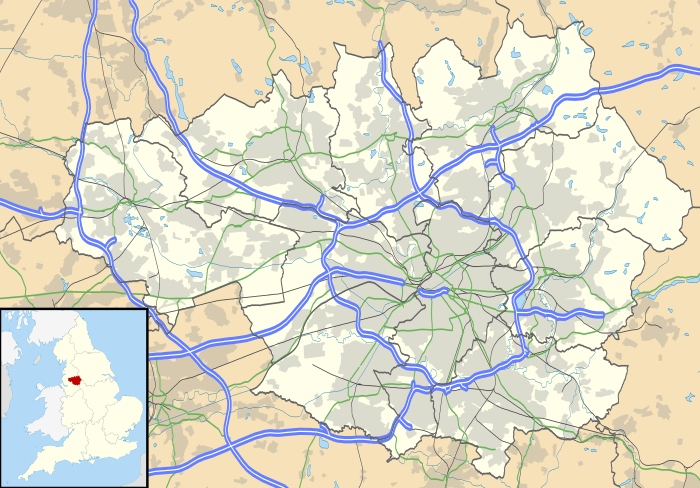Openshaw
Openshaw is an area of Manchester, England, about two miles east of the city centre. Historically part of Lancashire, Openshaw was incorporated into the city of Manchester in 1890. Its name derives from the Old English Opinschawe, which means an open wood or coppice.[1]
| Openshaw | |
|---|---|
 Openshaw Location within Greater Manchester | |
| OS grid reference | SJ885975 |
| Metropolitan borough |
|
| Metropolitan county | |
| Region | |
| Country | England |
| Sovereign state | United Kingdom |
| Post town | MANCHESTER |
| Postcode district | M11 |
| Dialling code | 0161 |
| Police | Greater Manchester |
| Fire | Greater Manchester |
| Ambulance | North West |
| UK Parliament | |
During the Second Industrial Revolution, when Openshaw become an area of heavy industry, socialism and trade unionism flourished. In 1910 the Openshaw Socialists were formed; Keir Hardie, founder of the Labour Party, spoke at their inaugural meeting. Annie Lee became Manchester's first socialist woman alderman in 1936, having been secretary of the Openshaw Independent Labour Party since the 1890s. Following profound de-industrialisation, Openshaw's population is now a fraction of what it was a century ago.
Industry
There is little industry in the district now. Very large enterprises such as a government munitions factory (ordnance works) and associated railway yards were closed after the First World War. Companies which employed thousands of people, but of which nothing remains, include RHM, Ferguson, Pailin & Co (later GEC Switchgear), the English Steel Corporation, B&S Massey and Crossley Brothers, and the Gorton Works of the Manchester, Sheffield and Lincolnshire Railway, later the Great Central Railway followed by the London and North Eastern Railway (LNER).
Gorton works exemplified the industries that sustained the economy of Openshaw and adjacent districts of Manchester during and after the Second Industrial Revolution.[note 1] It was established in 1848 to service locomotives and build carriages and wagons. The first locomotive was built in 1858 and by 1923, Gorton works had built more than 900 locomotives. The last steam engine was built for British Railways in 1950. The works then produced electric locomotives until it closed in 1963. The site is now the New Smithfield Wholesale Market, Manchester's wholesale fruit and vegetable market.[2][note 2]
Openshaw is, however, within the East Manchester Regeneration Scheme and new businesses are moving into the area.[3]
Education
There are four primary schools in Openshaw: Higher Openshaw Community Primary School, St Barnabas' CE Primary School, St Clement's CE Primary School and Varna Community Primary School.
Openshaw has no high school; Wright Robinson College in Gorton and Fairfield High School for Girls in Droylsden are nearby.
The Openshaw Campus of The Manchester College on Whitworth Street near Ashton Old Road (A635) specialises in new technical and industrial training, including construction craft and building services, motor engineering and computer technology.
Lime Square redevelopment
As part of the area's redevelopment under the East Manchester Regeneration Scheme, a new shopping precinct has been built called Lime Square. The majority of Lime Square is taken up by a Morrisons supermarket that was built in 2010, with The Range also in the same unit. It is also home to The Gym Group, McDonald's fast food restaurant, a doctors' surgery, several charity shops, a B & M, Greggs, Farmfoods, Savers, Poundland, Costa Coffee, and a Betfred bookmaker's, among others.
Transport
Gorton railway station provides frequent trains to Manchester Piccadilly on the Glossop–Hadfield and Rose Hill Marple line.
Openshaw is served by several bus services, most services are operated by Stagecoach Manchester.
- 7: Stockport to Ashton-under-Lyne. Operated by Stagecoach Manchester.
- 171: Newton Heath to Withington Community Hospital. Operated by Stagecoach Manchester.
- 172: Newton Heath to Withington Community Hospital. Operated by Stagecoach Manchester.
- 219: Manchester to Ashton-under-Lyne. Operated by Stagecoach Manchester.
- 220: Manchester to Stalybridge/Tameside General Hospital. Operated by Checkmate, Stagecoach Manchester & First Manchester.
- 221: Manchester to Dukinfield. Operated by Stagecoach Manchester & First Manchester.
Music
English actor and lead vocalist for the Monkees, Davy Jones, was born in Leamington Street, Openshaw.[4][5]
Composer Peter McGarr, born in 1953, lived in Openshaw for many years.[6]
Openshaw media
From March 2002, the North East Manchester Advertiser newspaper was delivered free to every home in Openshaw, providing a local news source. However, in September 2012 the newspaper ceased publication. The Openshaw Gazette was launched in the same month; it now exists as a Facebook page[7] and Twitter account.[8]
Notes
- Gorton locomotive works were not related to the Beyer, Peacock and Company's Gorton Foundry.
- Location: 53°28′16″N 2°10′37″W.
References
- http://www.manchester2002-uk.com/districts/openshaw.html
- "Gorton Locomotive Works, Openshaw, photographs". The National Archives. The National Archives [UK]. 2019. Retrieved 27 December 2019.
- "Archived copy". Archived from the original on 12 February 2009. Retrieved 25 November 2009.CS1 maint: archived copy as title (link)
- Davy Jones (musician)#Early life
- http://menmedia.co.uk/manchestereveningnews/tv_and_showbiz/s/1487050_stars-pay-tribute-to-davy-jones-after-manchester-born-star-of-the-monkees-dies-at-66
- http://www.petermcgarr-composer.co.uk
- https://www.facebook.com/pages/Openshaw-Gazette/340227242736389
- https://twitter.com/openshawgazette
External links
| Wikimedia Commons has media related to Openshaw. |